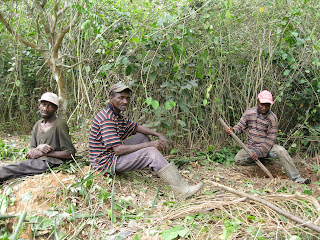by Caroline Berg (Projects Abroad)
 |
| Citrus Farmers |
For citrus farmers in the Central Region’s Abura-Asebu-Kwamankese District, overabundance is not a gift, but a burden. Central Press reporters found a group of seven harvesters one Friday in February resting in the shade of their six-acre orchard, looking somewhat dispirited. All around them, copious amounts of oranges lay under each tree in various degrees of decay.
While the Central Region Development Commission (CEDECOM) boasts a large portfolio of social intervention and economic projects to help grow and enhance the Central Region, the citrus industry so far remains its own advocate.
“We have the product, but no producers,” said Anthony Sam, a Field Officer for Pinora Company LTD. “The fruit is going bad.”
Here in the Central Region, farmers are understaffed, underpaid and underrepresented. Moreover, market demand is sorely deficient.
Last year, a sack full of roughly 100 oranges sold for GH¢4 each. When the farmers asked for GH¢8 per sack, their buyers would not budge. In the end, the farmers received GH¢4.20 per sack. The extra GH¢0.20 go to the hired hands who assist in loading and transporting the oranges.
“We want the Ministry of Food and Agriculture to at least collaborate with us,” said Kojo Prah, a farmer in the Abura-Asebu-Kwamankese District. “At the moment, we do not receive any support from the government.”
 |
| Some farmers at their farm |
According to Mr. Prah, the citrus in the orchard is going bad because he and his colleagues have no access to modern farming technology, including tractors to quicken the harvesting pace and pesticides to protect the citrus from rampant disease.
Obviously, no one wants to buy rotten or diseased fruit. Thus, productivity and buyer demand go hand in hand. Only when the farmers can produce a more desirable product may they expect incomes to better suit their hard work.
Another factor that is killing the citrus industry is the state of local processing plants. One citrus factory in the area has been defunct for decades and is now used as a private school, while another factory has been shut down for months due to malfunctioning machinery.
Consequently, Mr. Prah and his fellow farmers are calling on the government to make the citrus industry more attractive to investors.
“I would say to CEDECOM, they should help us,” Mr. Sam said, in accord with Mr. Prah’s grievances. “The farmers in the Central Region are really, really suffering.”
According to Mr. Sam, a working factory in the region could easily employ 200 to 300 people. With such a potentially fruitful citrus industry and ready workforce, how is it the government continues to ignore this agricultural sector?
Due to lack of support, increasingly more citrus farmers are abandoning the trade and cutting down their citrus trees. Even Mr. Sam is an example of the Central Region’s job bleeding in the agricultural sector. The young field officer is from the region and studied agriculture mechanics; however, he works out of the Eastern Region.
What the industry needs is better management. In November last year, the Cape Coast Farmers Cooperative Society Limited (CCFCSL) officially appealed to the government to establish some form of policy framework to actively help develop and promote citrus farming. Citrus farming is one of the largest fruit industries in Ghana with over 10,000 farmers across the country.
The creation of a Marketing Board would improve the standard of living for farmers, generate employment, boost local economies and alleviate poverty in the Central Region. In addition, the board would strengthen farmers’ negotiating powers and also assist in the production, harvesting, packaging, processing and marketing of all citrus varieties in the region.
“As for now, we farmers have no choice but to continue doing our job the way things are,” Mr. Prah said, “which is not providing us with positive results.”

No comments:
Post a Comment